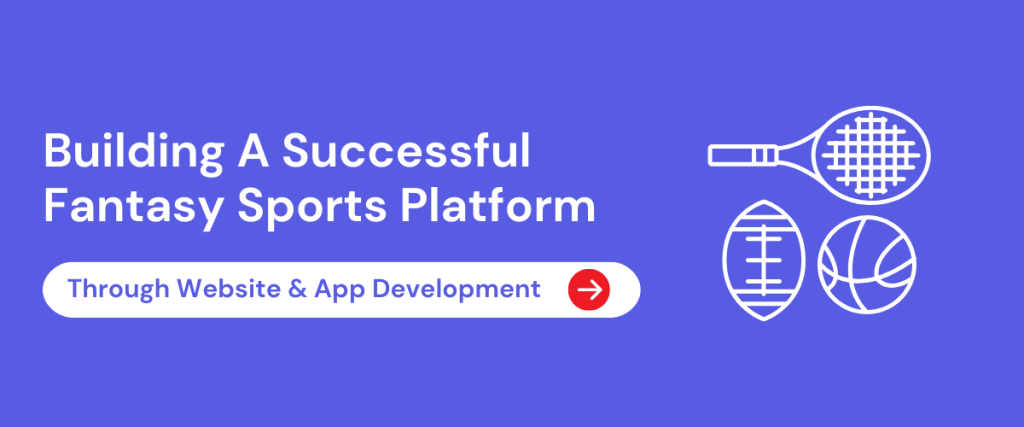The roar of the crowd, the last-second shot, the nail-biting tension – sports have a way of capturing hearts and minds.
But what if you could leverage that passion to build a thriving business? Fantasy sports offer a unique opportunity to do just that. Millions of fans already actively participate, drafting dream teams and competing for bragging rights (and sometimes, real prizes).
Developing a fantasy sports platform presents a compelling opportunity for businesses looking to tap into this engaged audience.
It’s not just about offering an essential website where users pick players. It’s about crafting a dynamic experience that fosters loyalty, drives user engagement, and keeps fans coming back for more.
But how do you create a fantasy sports platform that stands out from the competition? Here’s where website and app development come in.
We’ll dive deep into the key elements you need to consider, from crafting an intuitive user experience to integrating features that keep fans glued to their screens.
So, let’s get started:
What Is A Fantasy Sports Portal?
A fantasy sports portal is a website or app that allows users to play fantasy sports games. These games are like a simulation of real-life sports leagues, but instead of managing actual teams, the users draft virtual teams made up of real professional athletes.
Here’s how it works:
- Drafting the team: The portal will provide users with a budget and a pool of real players from their chosen sport (like football, basketball, or baseball). The users will use their budget to “draft” these players to a virtual team.
- Scoring points: The performance of the athletes they drafted in real-life games translates into points for for the fantasy team. These points are typically based on statistics like touchdowns, home runs, or rebounds.
- Competing against others: The user can join leagues with other users on the fantasy sports portal and compete against them based on the teams’ total points.
Fantasy sports portals offer a variety of features to enhance the user’s gameplay, such as:
- Up-to-date player stats and news
- Tools to help them analyze and manage the team
- Discussion forums to connect with other fantasy sports enthusiasts
These portals have become a popular way for sports fans to engage with their favorite sports and test their knowledge and strategic thinking.
Key Components Of A Successful Fantasy Sports Portal
To be successful, a fantasy sports portal needs to have a number of key components.
1. User-Friendly Interface
First impressions are always important, and this is especially true for fantasy sports portals. The user interface (UI) should be clean, intuitive, and easy to navigate.
Users should be able to find the information they need quickly and easily, and the process of creating and managing a team should be straightforward.
2. Comprehensive Sports Coverage
A successful fantasy sports portal should offer coverage of a wide range of sports. This includes popular sports like football, basketball, and baseball, as well as more niche sports like hockey, soccer, and golf. The portal should also provide up-to-date news, statistics, and analysis for all of the sports that it covers.
3. Robust Fantasy Sports Features
The core functionality of a fantasy sports portal is, of course, the ability to create and manage fantasy teams. The portal should offer a variety of features to help users do this, such as:
- Drafting: Users should be able to draft players to their teams, either in a live draft or through an automated draft.
- Lineup management: Users should be able to set their lineups for each week’s games and change them as needed.
- Scoring: The portal should track the statistical performance of each team’s athletes and calculate points based on a fair and balanced scoring system.
- Standings and leaderboards: Users should be able to see how their team is doing compared to other teams in their league or contest.
4. Social Features
Fantasy sports are more fun when you can play with your friends and family. A successful fantasy sports portal should offer a variety of social features to help users connect with each other, such as:
- League management tools: Users should be able to create and manage their own leagues, and invite their friends and family to join.
- Chat rooms and forums: Users should be able to chat with other users about their teams and the games.
- Social media integration: Users should be able to share their fantasy teams and results on social media.
5. Security and Reliability
Security and reliability are essential for any fantasy sports portal. The portal should use strong security measures to protect user data, and it should be reliable and up-to-date. Users should be able to trust that the portal will be available when needed, and that their data is safe.
By incorporating these key components, fantasy sports portals can create a fun and engaging experience for sports fans of all levels.
We hope that the key components are clear to you and now we can move to the step-by-step guide to building your own fantasy sports portal:
Building A Fantasy Sports Portal: A Complete Guide
Here are the major steps that you need to follow to build a solid fantasy sports portal:
1. Concept and Planning
Before diving into development, take a moment to solidify your concept. What sports will you offer? Will it be a free-to-play platform, or will there be paid contests? Who is your target audience? Answering these questions will guide your design and development choices.
2. Designing the User Experience
Here’s where things get exciting! Design a user-friendly interface for both your website and mobile app. The key is intuitiveness. Users should be able to navigate through features like registration, team creation, and joining contests with ease.
3. Functionality
Now comes the technical part. Here are some core functionalities to consider:
- User Management: Allow users to register, create profiles, and manage their accounts. Secure logins and social media integration are a plus.
- Team Building: This is the heart of fantasy sports. Users should be able to draft their teams, considering factors like salary caps and player performance projections.
- Live Scoring and Updates: Keep users engaged with real-time scoring updates, including player statistics and standings. Push notifications for important updates are a great way to boost user engagement.
- Contests and Leagues: Offer a variety of contest formats (free and paid) and league structures (public and private) to cater to different preferences. An integrated payment gateway is crucial for paid contests.
- Content is King: Provide valuable content to keep users coming back. This could include news articles, player analysis, expert insights, and even a fantasy sports blog.
4. Development
There are two main approaches to development:
- Do-It-Yourself (DIY): If you have the technical expertise, you can use website-building tools and app development frameworks to create your portal. However, this requires significant coding knowledge.
- Hiring a Development Team: Partnering with a professional development team experienced in fantasy sports website and app development is a secure and efficient option. They can handle the technical aspects while you focus on the business side.
5. Testing and Refinement
Before launching your portal, conduct rigorous testing on both the website and mobile app. Identify and fix bugs to ensure a smooth user experience. Gather feedback from beta testers to refine your portal before it goes live.
6. Launch and Marketing
It’s go time! Spread the word about your fantasy sports portal. Utilize social media marketing, content marketing strategies, and even influencer partnerships to attract users.
7. Maintenance and Growth
Building a successful fantasy sports portal is an ongoing process. Regularly update your app with new features, address user feedback, and stay updated with the latest sports trends.
Remember, a strong community is key to user retention. Encourage interaction through forums, chat rooms, or social media groups where users can discuss strategies and make the competition even more exciting!
By following these steps and keeping your finger on the pulse of the fantasy sports landscape, you can build a thriving portal that caters to the needs of sports enthusiasts everywhere.
Building Your Dream Fantasy Sports Platform With Skein Technologies
Launching a successful fantasy sports portal requires dedication, strategic planning, and the right tech partner. That’s where Skein Technologies comes in. Our team of passionate developers boasts extensive experience in crafting user-centric fantasy sports app platforms.
We understand the intricacies of the fantasy sports app development and can translate your vision into a robust, scalable platform. From user interface design and secure back-end development to seamless integration of features like real-time scoring and payment gateways, Skein Technologies takes care of everything.
We don’t just build apps, we build communities. We’ll guide you through every stage of development, ensuring your fantasy sports portal is not just functional, but fosters a thriving community of sports fans.
So, are you ready to turn your fantasy sports dream into reality? Contact Skein Technologies today for a free consultation and let’s build your champion fantasy sports platform together!


